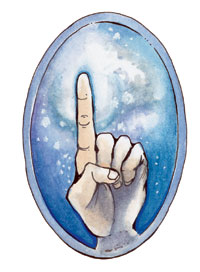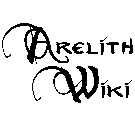Azuth
- The High One, Patron of Mages, Lord of Spells
- Faerûnian Lesser Power: Auril | Azuth | Bahamut | Deneir | Eldath | Lliira | Loviatar | Malar | Mask | Milil | Shaundakul | Talona | Tiamat | Torm | Waukeen | Ibrandul
| Aliases: | {{{Deity Aliases}}} |
| Gender: | {{{Deity Gender}}} |
| Demonym: | {{{Deity Demonym}}} |
| Power Level: | Lesser Power |
| Symbol: | Human left hand pointing upward outlined in blue fire |
| Alignment: | Lawful neutral |
| Portfolio: | Wizards, mages, spellcasters in general, monks (Shining Hand) |
| Worshipers: | Philosophers, sages, sorcerers, wizards |
| Domains: | Illusion[1], Knowledge, Magic, Law[1], Spells[1] |
| Arelith worshippers' alignments[2]: | LE, LG, LN |
| Aspects: | {{{Deity Aspect1}}}, {{{Deity Aspect2}}} |
| Arelith Aspect 1 | Arelith Aspect 2 |
|---|---|
| Knowledge and Invention | Magic |

Church
Azuth (ah-zooth) concerns himself with the advancement and preservation of the magical arts. Worshiped by all manner of spellcasters (and wizards in particular), the crafty deity has long acted as an advisor to the sitting deity of raw magic; he and Mystra share an amicable relationship akin to that of a tutor and his favored student. Other deities find him crotchety, not understanding his dry wit or ceaseless dedication to collecting magical knowledge. Azuth most often appears as a white-bearded man wearing elaborate, antique clothing and wielding the powerful, gem-topped Old Staff.
Among the most blessed of Azuth's terrestrial servants are the Favored, thought to be a cadre of slain human wizards resurrected by the Lord of Spells himself but which are in fact magical constructs of his subconscious mind. The Favored further the development and channeling of the Weave through written formulas, a process Azuthans view as the apogee of human scientific achievement. Possessing uncanny abilities such as telekinesis and flight, these paragons of magical power deliver important messages to the flock and herald new developments in magical sciences. Azuth has struggled desperately since the Time of Troubles to reconcile the old Mystra with the new, and with the resulting difference in the Weave that blankets Toril. Though the deity does not know it, the Favored -- mental manifestations of this struggle -- are tearing his church apart and may cost the Lord of Spells, and his worship, significantly.
Despite the ecclesiastical turmoil within, many outsiders view Azuth's religion as tradition-bound. To them, it adapts to the times at a glacial pace, concerning itself overmuch with abstract arcane debates while remaining blind to the problems that beset the land. Since so many of Azuth's followers take a neutral stance on matters of morality, the church often comes under criticism by the more proactive cults of Mystra.
Clerics of Azuth pray for their spells at dusk. Whenever a mage ascends to the rank of Magister, Azuth's church celebrates a holiday. His clerics recognize few other holidays of note, though liturgical readings at meal times play an important role in honoring the Lord of Spells. Texts composed by famous wizards make up the bulk of the church's canon. Clerics of Azuth commonly multiclass as arcane devotees or wizards.
History and Relations
As a mortal, Azuth coveted power, researching the arcane lore of a dozen fallen empires in an effort to further his magical study. His dedication eventually led to his being installed as the first magister, a position created specifically by Mystra to recognize her most promising mortal pupil. Azuth then sought to carve a piece of the deity Savras' divinity and bind it to himself -- an experiment that ultimately failed. This led to a series of battles with Savras, ending with the deity's imprisonment in a staff. With the help of Mystra, who had become his lover, Azuth finally ascended to divine status. Savras (now freed from his imprisonment) grudgingly serves Azuth, as does the generally untrustworthy Velsharoon.
Clergy and Temples
Azuth's clergy includes wizards and monks, though single- and multiclassed clerics hold most positions of power within the hierarchy. These individuals, known collectively as the magistrati, facilitate communications between arcane spellcasters. Magistrati tend to dress in elaborate and impractical dull-colored clothing accented by absurdly high collars, large hats, and stoles bearing arcane symbols.
Azuthan centers of worship are common in civilized nations, particularly in cities with powerful arcane guilds. There, magistrati enforce the Magebond, an informal agreement taught to nearly all wizards since the era of Azuth's reign as the first Magister. The Magebond stipulates that disputes between wizards should not spill over into the community at large--that magic is best left to those with the willpower to study and master it, and that the destruction inherent in magical duels casts mages in the worst light imaginable. (Of course, as many wizards scoff at these "rules" as follow them.) Conflicts between wizards, according to the tenets of the Magebond, should be conducted in private according to the dictates of a complicated, usually nonlethal ritual that pits mage against mage in a spellweaving duel. Naturally, the magistrati oversee such contests, and they keep the lore and ritual of these duels a closely guarded secret.
The most powerful member of a given temple community is known as the "First," and is referred to as "Revered One" by his or her inferiors. Those who have served the High One for a great deal of time are sometimes called "Master," but the clergy frowns upon more ostentatious titles. Many patriarchs live to be well over 150 years old, spawning rumors falsely claiming that high clerics of the inner circle have discovered the secret to immortality.
Azuth's Favored hold an important place in the clergy, both outside and above the regular church hierarchy. Recently, two influential Favored have ascended to important roles within the church. Meldrathar Gath of Halruaa leads the Loomwarden faction, whereas Szesoch Vurlagor of Thay leads the more accepting Spellsavants. The stern Loomwardens question the somewhat chaotic nature of Mystra, the Mother of All Magic, who is often a patron of sorcerers. They distrust sorcerers for the accident of their innate ability, at best reminiscent of the ancient archwizards of Netheril, who through raw spellcasting power brought a great empire to ruin.
In cities such as Halarahh and Bezantur, influential Loomwardens work behind the scenes to bar sorcerers from positions of power and thwart what they see as a danger. The spellsavants, on the other hand, urge cooperation between all types of arcane spellcasters, holding that through cumulative effort humanity's knowledge of magic as a whole intensifies. Since the Time of Troubles, these mutually exclusive ideologies have come into sharper and sharper conflict, with entire churches splitting apart along factional lines.
Dogma
Reason is the best way to approach magic, and magic can be examined and reduced to its component parts through study and meditation. Maintain calm and use caution in your spellcasting and magic use to avoid making mistakes that even magic cannot undo. Use the art wisely, and always be mindful of when it is best not to use magic. Teach the wielding of magic and dispense learning throughout Faerun that the use and knowledge of magic may spread. Live and teach the idea that with magical power comes grave responsibility. Learn every new spell you discover and make a copy for the temple library. Do not hoard your knowledge, and encourage creativity in magic in all ways and at all times.
